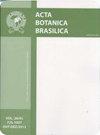唇瓣是否有助于区分兰科植物的种类?几何形态计量学的见解
IF 1.1
4区 生物学
Q4 PLANT SCIENCES
引用次数: 1
摘要
本文章由计算机程序翻译,如有差异,请以英文原文为准。
Is the labellum informative to distinguish species of Scaphyglottis(Orchidaceae)? Insights from geometric morphometrics
Scaphyglottis Poepp. & Endl. (Orchidaceae) is a neotropical genus with 78 species, 14 of which are found in Brazil. Some of these taxa have an intricate taxonomy, especially due to the morphological similarity among species and the existence of species complexes. Our study aims to test if the labellum shape, the main source of species diagnostic characters, can confirm the proposed circumscription of Brazilian species of Scaphyglottis . We analyzed 136 flowers from 12 species, to which we applied 12 landmarks, using a geometric morphometrics approach. Our results show that most species can be distinguished. Most of the variation is observed in the claw and apices of labellum lobes, confirming that the labellum is important tool in taxon distinction. Species with distinctly 3-lobed labellum showed some overlap but, for these taxa, we have found distinction specially in the lateral lobes. Our study showed new morphologically variable features in Scaphyglottis that can be used in future taxonomic studies. For widely distributed species we suggest a population-level approach, as local environmental factors can impact morphology, causing expected intraspecific variation.
求助全文
通过发布文献求助,成功后即可免费获取论文全文。
去求助
来源期刊

Acta Botanica Brasilica
PLANT SCIENCES-
CiteScore
2.30
自引率
9.10%
发文量
32
审稿时长
6-12 weeks
期刊介绍:
Experimental, theoretical and applied papers on all aspects of plant (including algae) and fungi biology are welcome. The submitted manuscript or its essential content must not have been published previously or be under consideration for publication elsewhere. Contributions should be substantial, written in high-quality English and show general interest. We expect that the submitted manuscript presents a great novelty in Botany, and this should attract a wide audience. Considering this, case studies are only considered if the narrative and implications are provided to be of general interest. Thus, manuscripts that report aspects of local interest are discouraged unless the implications of the findings are wide-reaching. Manuscripts with agronomic subjects are expected to contain a substantial amount of basic plant biology. Please see below some details for specific area.
 求助内容:
求助内容: 应助结果提醒方式:
应助结果提醒方式:


